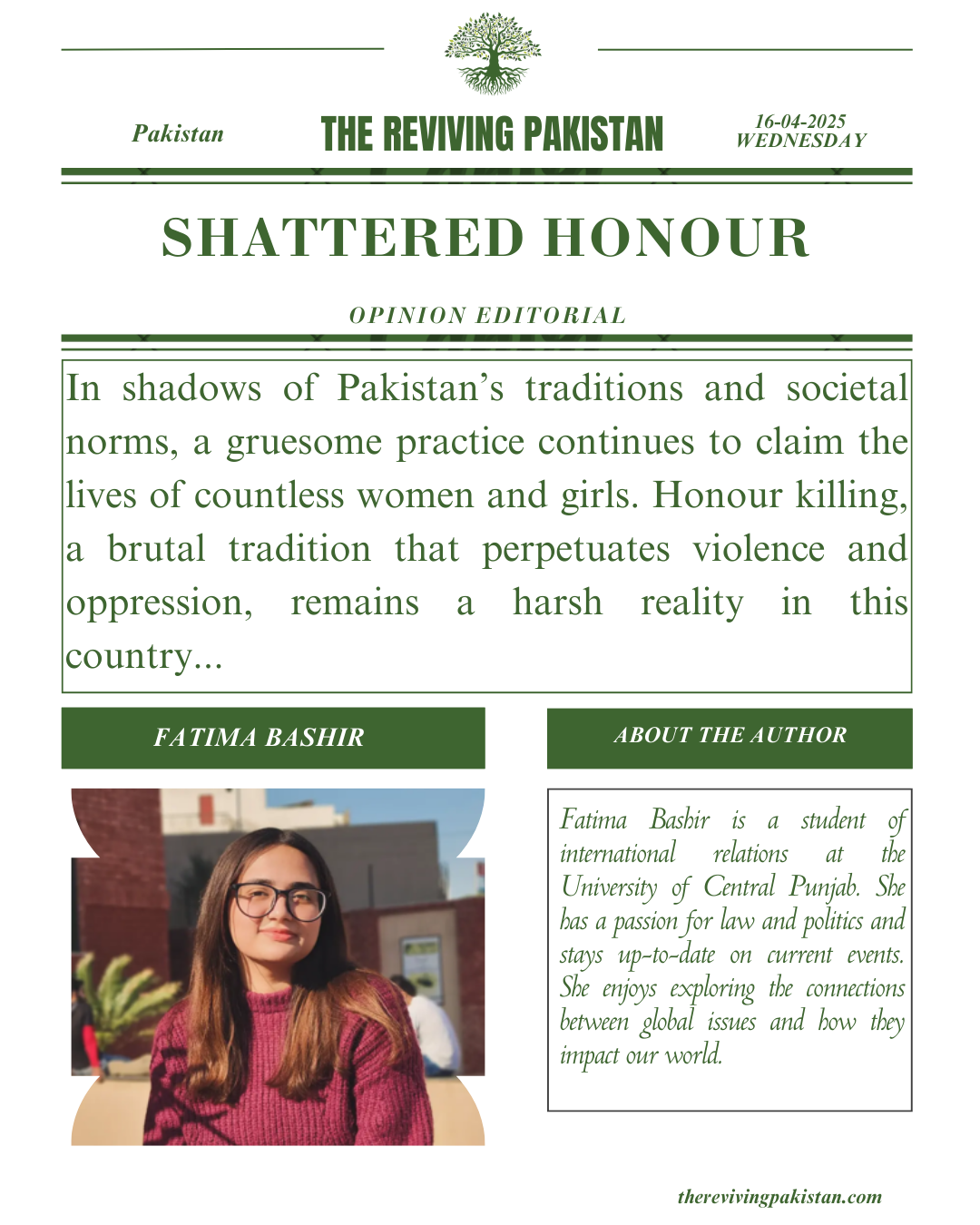
Fatima Bashir
Fatima Bashir is a student of international relations at the University of Central Punjab. She has a passion for law and politics and stays up-to-date on current events. She enjoys exploring the connections between global issues and how they impact our world.
In the shadows of Pakistan’s traditions and societal norms, a gruesome practice continues to claim the lives of countless women and girls. Honour killing, a brutal tradition that perpetuates violence and oppression, remains a harsh reality in this country. Behind the veil of tradition and family honour, innocent lives are being brutally taken away. This article aims to shed light on the dark reality of honour killings in Pakistan, exploring their roots, consequences, and the urgent need for change.
- UNDERSTANDING THE ROOTS OF HONOUR KILLINGS:
In Pakistan, this phenomenon is deeply rooted in the patriarchal societal norms and culture. In the country’s patriarchal society, a family’s honour is absurdly tied to a woman’s actions. This logic is fundamentally flawed, as it implies that a woman’s choices and circumstances define a family’s dignity. In reality, the fragility of masculinity among Pakistani men is exposed when women refuse to conform to societal expectations, such as declining arranged marriages or seeking divorce. Even becoming a victim of rape can be perceived as a threat to their masculinity. Women are often confined to their homes and expected to adhere to traditional roles. When they question these expectations or strive to build independent lives, it’s seen as a rebellious act that tarnishes the entire family’s honour. This raises an important question: why must a woman bear the weight of an entire family’s dignity and honour? It calls for a critical examination of the unjust burden placed on women and the societal norms that perpetuate this mindset. The reason behind this is hegemonic masculinity. Pakistani men often embody a form of hegemonic masculinity that emphasizes dominance, control, and stoicism. This stoic attitude manifests as an expectation to suppress emotions-except for anger and aggression, which are deemed acceptable masculine traits. When women challenge traditional norms-such as refusing arranged marriages or seeking divorce, it threatens the masculine identity of men, who may feel their control and dominance slipping. This perceived loss of control can trigger violent reactions, including honour killings, as men attempt to reassert their dominance and restore their honour. Recently, a man killed his fasting mother over a delay in breakfast in Gujrat, Punjab. It’s an example of how men think they should have control over anything and everything. This need for control stems from a deep-seated insecurity, highlighting the complexities of toxic masculinity.
- THE DEVASTATING CONSEQUENCES:
Honour killings remain a persistent issue in Pakistan, occurring with disturbing regularity. In 2022, there were 590 reported cases, while in 2023, the country saw a total of 490 reported incidents. Unfortunately, honour killings continued throughout 2024. It’s important to note that these numbers only reflect reported cases, and the actual figures are likely higher due to underreporting.

Qandeel Baloch’s brutal murder by her brother in 2016 shocked the nation. She was killed for her online presence, which her family deemed “shameful.” Her tragic fate highlights the dark reality of honour killings—a nation’s conscience is still haunted by her memory.
In October 2024, a man murdered four female family members, including his mother, after an argument over their TikTok videos. When asked about it, he said, “ The videos spread immodesty and shamelessness, tarnishing the family’s reputation”. The year 2024 saw a number of such cases. In July, Mohabbat Khan killed his wife, Shahnaz, and daughter, Samia, with a dagger in an ‘honour’ killing. In November, Shaheena Bibi, 20, was killed by her father and brother after previously eloping. In September, Saira, 19, and her husband were shot dead by her brother for marrying against the family’s wishes. In August, a mother of five was beaten to death with bricks by her husband and brother over alleged infidelity. In December, Amina Bibi, a mother of three, was shot dead by her brother for having a “questionable character.”
- BREAKING THE SILENCE:
To combat honour killings, breaking the silence surrounding this issue is crucial. Open discussions in seminars and conferences can help raise awareness and bring the topic to the forefront. Education on such issues is essential for their mitigation. Strengthening laws and ensuring punishment for perpetrators is also vital. However, the key challenge in Pakistan lies in the effective implementation of existing laws. Without proper enforcement, laws remain ineffective, and the cycle of violence continues. Therefore, strict implementation is the need of the hour to bring about meaningful change. Since victims are mostly blamed in Pakistan, there should be shelters available for their protection and rehabilitation.
The twisted veil of “honour” shrouds Pakistan in shame, as innocent lives are brutally extinguished in the name of a warped virtue. There is no honour in bloodshed, no dignity in cruelty. The perpetrators’ actions are a stark reminder of the nation’s darkest impulses. Can Pakistan truly claim to be a land of humanity when it condones such heinous crimes? The very notion of “honour” is desecrated by these acts of savagery.

